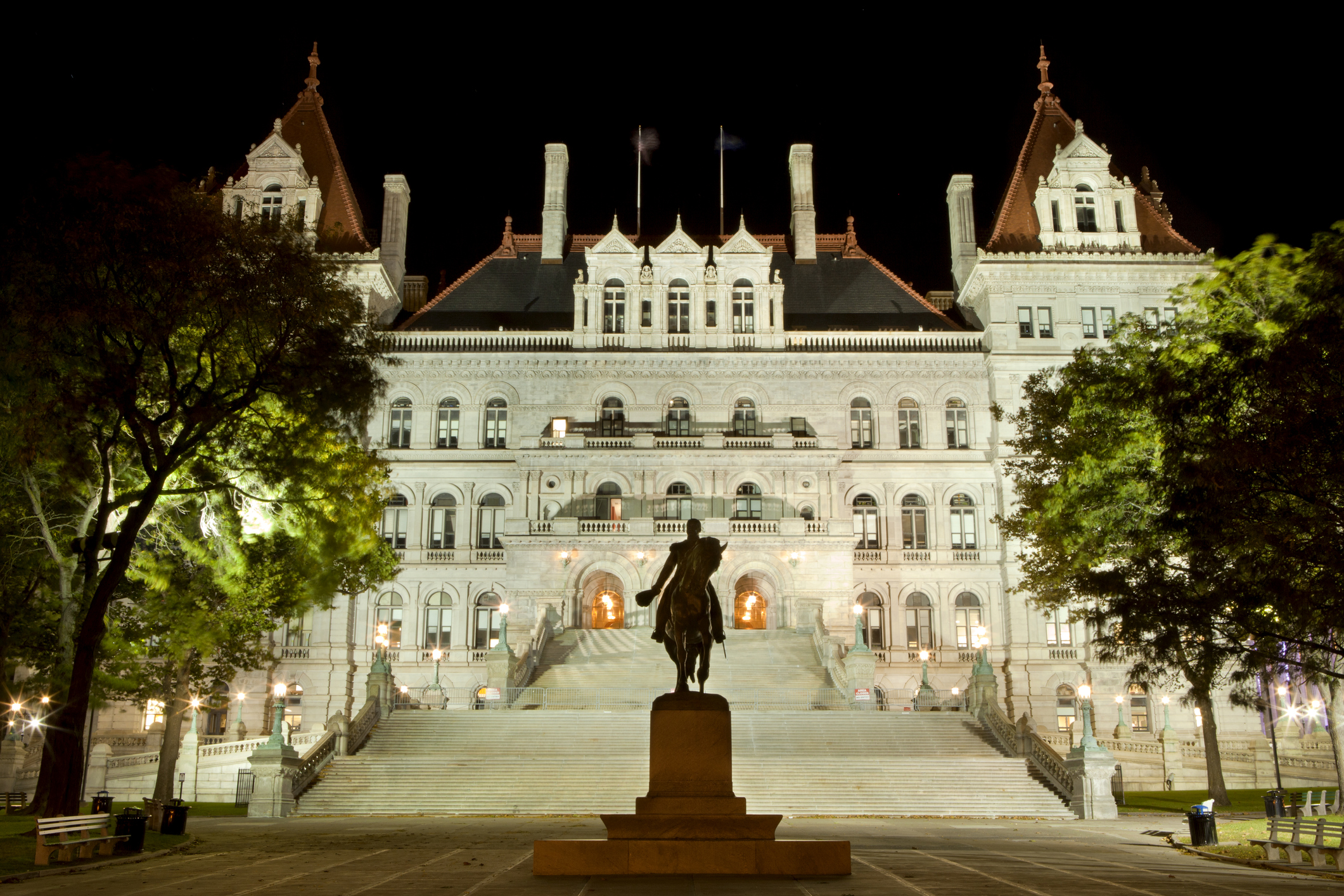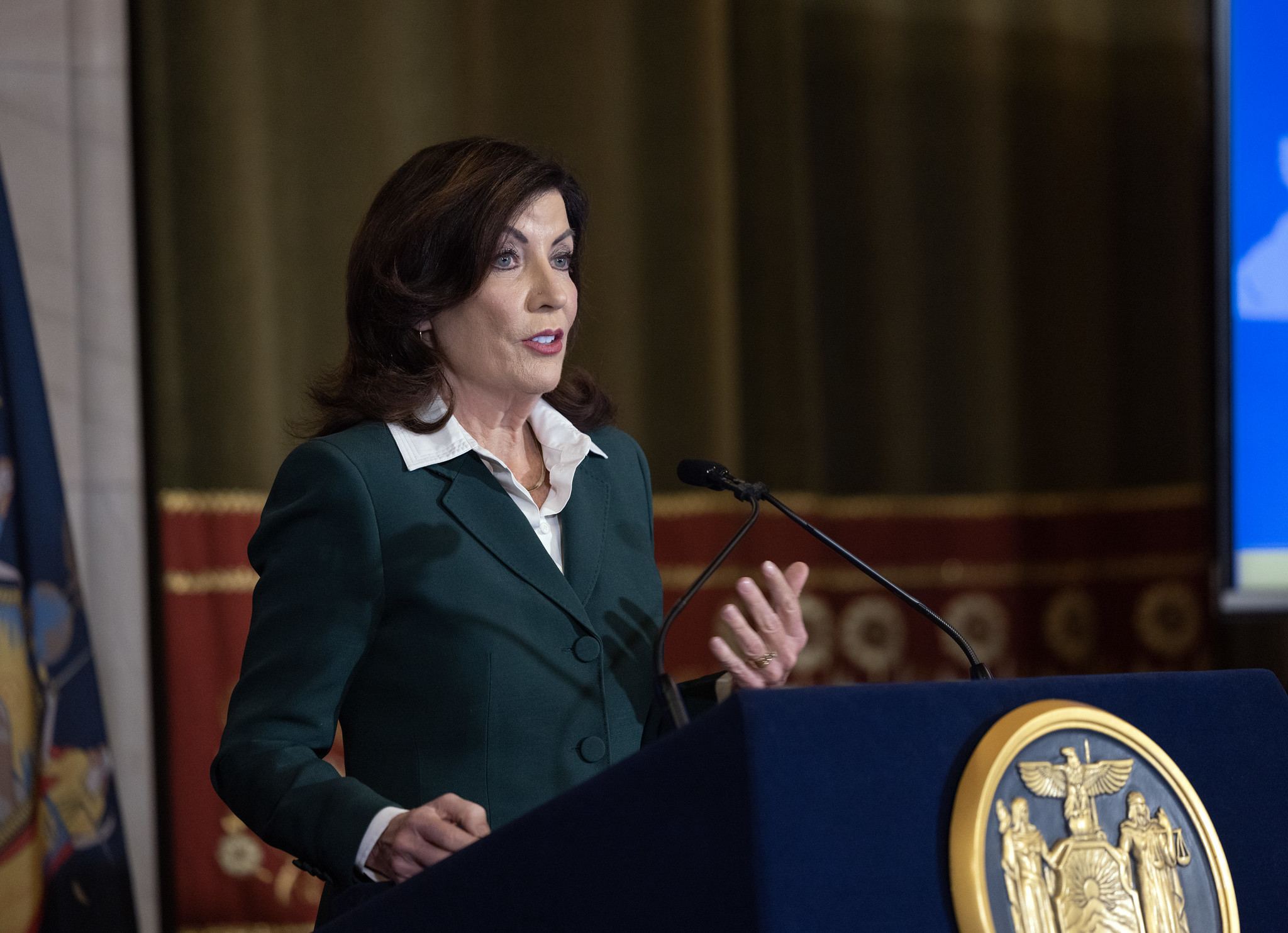NY Budget Battle: Spending Plan Includes Policy to Impact East End

New York State lawmakers passed a $229 billion budget on May 2 — over a month after the deadline — that includes myriad policy changes impacting the East End, greater Long Island and beyond.
In addition to funding for schools, mass transit and social programs, the legislative package includes increases to the state-mandated minimum wage, changes to how judges can set bail and it enacts rules mandating real estate developers pause construction when human remains are uncovered — the long-sought Native American burial ground protection act.
“I know this budget process has taken a little extra time, but our commitment to the future of New York was driving this,” Gov. Kathy Hochul said April 27 when she announced she reached an agreement with legislators on the spending package. “We’re building a path of shared prosperity for all New Yorkers, and I’m very proud of this budget.”
The state budget’s passage comes two weeks before voters head to the polls to cast their ballots May 16 in local school district budgets — generally the largest portion of area property tax bills.
Here’s a look at some of the 2024 budget that state lawmakers in Albany approved.

New York State Budget 2024 Highlights
BURIAL PROTECTION
The enactment of the Unmarked Burial Site Protection Act, which sets in place a protocol for how to respond to the discovery of human remains while excavating land, has been a long time coming.
The issue is of importance to Native Americans whose ancient ancestors’ unmarked graves are sometimes unearthed during construction projects on the East End. After being repeatedly vetoed, the law passed as part of the budget will enable an archeologist to oversee the process when such discoveries are made.
“I think it is long overdue,” said Bryan Polite, who chairs the Shinnecock Indian Nation Council of Trustees, who were among multiple tribes advocating for the law’s passage. “New York State was one of a very few states that did not have this type of important law … Implementation is going to be vital, but this is a big step in the right direction.”
SCHOOL FUNDING
While the governor struck a cautious tone — citing economic headwinds that include the recent collapse of the third bank in recent months, emphasizing that the budget doesn’t tap into the state’s rainy day fund — the budget does increase aid in key areas.
With the proximity of the state budget’s passage to the school budget vote, education funding is top of mind for lawmakers, educators and parents alike. State Assemblyman Fred W. Thiele Jr. (D-Sag Harbor) said there were “massive school aid increases for Riverhead, Hampton Bays, and Greenport with the full funding of Foundation Aid.”
“All districts get at least a 3% increase in Foundation Aid,” he added.
OTHER STATE AID
There were increases in assistance beyond the classroom as well, much of which touches the Twin Forks.
“There’s plenty that affects the East End,” Thiele said.
State funding for the South Fork Commuter Connection was increased from $500,000 to $750,000 “because of the increase in ridership,” added Thiele, who fought for the key Long Island Rail Road connection.
In addition, funding for the Peconic Estuary was increased from $450,000 to $550,000. The budget included enactment of the Suffolk Water Restoration Fund — which will be subject to mandatory referendum — that generates about $3.1 billion from now until 2060, with 75% of the funds going toward upgrading antiquated septic systems in communities without sewers.
That’s on top of $175,000 for the South Fork Behavioral Health Initiative, $175,000 for the North Fork Behavioral Health Initiative, $400 million for the Environmental Protection Fund and $500 million for Water Quality Infrastructure Improvements, according to Thiele.
Full details of the budget were not immediately available as lawmakers were still voting through the night on various associated pieces of legislation as Dan’s Papers was going to print.
New York’s criminal justice reforms in the wake of nationwide protests to Minneapolis police killing George Floyd had sparked much debate over whether the elimination of bail for many criminal cases caused an increase in crime, recidivism or both.
While the crime statistics continue to be debated ad nauseam by those on either side of the issue, Hochul was able to channel the debate to push through a change to the bail law that will eliminate the standard that requires judges to prescribe the “least restrictive” means to ensure defendants return to court.
Hochul said judges needed the extra discretion. Some liberal lawmakers argued that it would undercut the sweeping bail reforms approved in 2019 and result in more people with low incomes and people of color in pretrial detention.
Though Hochul was able to push through changes in bail law, she was unable to convince lawmakers to include her high-profile plan to spur the creation of 800,000 new homes statewide as a way to ease housing shortages. Suburban lawmakers balked at local zoning mandates in the plan.
MINIMUM WAGE
Under the agreement announced late Thursday, New Yorkers would be guaranteed an hourly wage well above the federal minimum of $7.25.
The minimum wage would be raised to $17 in New York City and some of its suburbs and $16 in the rest of the state by 2026. That’s up from $15 in the city and $14.20 upstate. Future increases would then be tied to the Consumer Price Index for Urban Wage Earners and Clerical Workers, a measurement of inflation.
The deal would keep the state near the top of the list of places with the highest base pay for low-paid workers, but the raise amount is disappointing some labor activists who had hoped for a bigger bump.
They would still earn less than workers in California, Washington and Hawaii, which will all most likely have minimum wages of $18 or higher by 2028, according to the National Employment Law Project.
Opponents of the wage increase have also said they aren’t supportive of the agreement, saying it can be detrimental to small businesses that already took major hits during the COVID-19 pandemic.
The wage increase could be particularly detrimental to dairy farmers, forcing them to either cut staff or hours, or close down altogether, said Steve Ammerman, a spokesperson for the New York Farm Bureau, a group that represents farmers. He said inflation and minimum wage increases have already led to farm closures and that the latest increase will make it harder for farms to stay in business.
GAS STOVES
New York State is banning natural gas stoves and heating systems in most new buildings, a policy that’s part of a national movement aimed at reducing greenhouse gas emissions.
Most new construction would be required to have zero-emissions under a mandate to be phased in starting in 2026, with buildings under seven stories. The mandate would mean no gas furnaces or stoves in most new construction. The mandate would not affect existing buildings. When the phase-in starts, newly constructed buildings will have to forego fossil fuel equipment in favor of devices like induction ranges and heat pumps that run on electricity.
“I want to be very clear. I know people love to misinterpret this, but people with existing gas stoves, you’re welcome to keep them,” Hochul told reporters, before lawmakers began voting on the budget. “This is where our nation has to go eventually,” she said “But I want to make sure that it’s not a bumpy road to the transition.”
Critics say it will add costs to new construction and put more strain on the electrical grid, while still limiting options for buyers of newly constructed homes.
“Why shouldn’t people have a choice on how to heat their home?” asked Republican Assemblyman Phil Palmesano.
There are a number of exemptions, such as for emergency backup power and for commercial food establishments, laboratories and car washes. Advocates say New York is the first state in the nation to adopt such a law. Though Washington state recently approved codes that will require the installation of heat pumps in most buildings.
Overall, the plethora of non-spending-related policies crammed into the budget frustrated legislative leaders.
“I would have liked to have done this sooner. I think we would all agree to that,” State Senate Majority Leader Andrea Stewart-Cousins told reporters before voting began. “This has been a very policy-laden budget and a lot of the policies had to be parsed through.”
-With Associated Press



